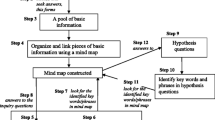Abstract
Analyzing case studies in a professional ethics course can be quite challenging for students. To help, we have developed a system called Umka that supports students in this analysis by: (i) directly critiquing the arguments of a student; and (ii) supporting collaboration among multiple students. Umka achieves this support through the interaction of a well-structured interface and the use of latent semantic analysis (LSA). We conducted an experiment, which demonstrated that this cross-interaction of the interface and LSA could be a promising way to ”diagnose” a student’s argument even without full natural processing.
Access this chapter
Tax calculation will be finalised at checkout
Purchases are for personal use only
Similar content being viewed by others
References
Graesser, A., Lu, S., Jackson, G., Mitchell, H., Ventura, M., Olney, A., Louwerse, M.: Autotutor: A tutor with dialogue in natural language. Behavior Research Methods 36(2), 180–192 (2004)
Author information
Authors and Affiliations
Editor information
Editors and Affiliations
Rights and permissions
Copyright information
© 2012 Springer-Verlag Berlin Heidelberg
About this paper
Cite this paper
Sharipova, M., McCalla, G. (2012). Supporting Students in the Analysis of Case Studies for Professional Ethics Education. In: Cerri, S.A., Clancey, W.J., Papadourakis, G., Panourgia, K. (eds) Intelligent Tutoring Systems. ITS 2012. Lecture Notes in Computer Science, vol 7315. Springer, Berlin, Heidelberg. https://doi.org/10.1007/978-3-642-30950-2_106
Download citation
DOI: https://doi.org/10.1007/978-3-642-30950-2_106
Publisher Name: Springer, Berlin, Heidelberg
Print ISBN: 978-3-642-30949-6
Online ISBN: 978-3-642-30950-2
eBook Packages: Computer ScienceComputer Science (R0)




